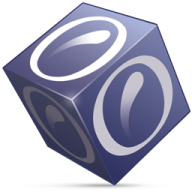OLAT
 | |
| Developer(s) | University of Zurich |
|---|---|
| Initial release | May 7, 2002 (1.6)[1] |
| Discontinued |
7.8.6.1 (July 27, 2016) [±] |
| Preview release | none [±] |
| Written in | Java |
| Operating system | Cross-platform |
| Available in | Multi-lingual |
| Type | Learning management software |
| License(s) | Apache 2.0 Open Source License |
| Website | OLAT.org |
OLAT was free web-based open-source learning management software developed by the University of Zurich.
Product history
OLAT began as an information technology project at the University of Zurich. The project goal was to develop and implement a web-based learning environment for a tutorial associated with a computer science lecture during the winter semester of 1999/2000.[2] The OLAT project went on to win the MeDiDa-Prix 2000 award, splitting the 1,000,000 Austrian Schilling prize with the "Living What We Teach" program based out of University of Stuttgart.[3] Buoyed by their success, the OLAT project carried on in earnest, with private internal updates to the software and a new OLAT-specific service center going into action on June 5, 2001.[4] The software was eventually made open-source and available for download — beginning with version 1.6 — on May 7, 2002.[1]
On July 23, 2004, a completely revamped, component-based version 3.0 of the software was released, programmed with the Java language.[5] In late 2006, version 5.0 was released, featuring wiki support, a calendar, and a full text search feature.[6]
With the release of version 7.1 in early 2011, the development model for OLAT reportedly became much more closed, with much of the development process occurring "behind closed doors."[7] This led to OLAT co-founder Florian Gnägi and his business frentix GmbH to pull out of the OLAT development process in late-2011 and fork the project as OpenOLAT.[7]
The last known free and open version of OLAT was 7.8.6.1. A jump to version 10 reportedly happened in August 2016[8], but it's not clear if it was free and open. Since then, it's not clear if a free and open-source version of OLAT is available to the public. The project is presumably closed-source at this point.
Features
The main features of OLAT included[9]:
- discussion forum tools
- wiki tools
- calendar tools
- blog tools
- e-mail and chat support
- user-based security
- user groups
- static or dynamic content creation
- configurable layouts
- testing and scoring
- user portfolios
- notifications
- CP and SCORM compliance
Hardware/software requirements
Installation requirements for OLAT included:
Videos, screenshots, and other media
- Videos for OLAT can be found on YouTube, though sadly they are in German.
- Screenshots of OLAT can be found on Softpedia.
- A demo of OLAT is available via the OLAT site.
- Documentation for OLAT can be found here.
Entities using OLAT
Further reading
External links
References
- ↑ 1.0 1.1 "OLAT Zentrum News". University of Zurich. Archived from the original on 15 June 2002. http://web.archive.org/web/20020615051123/http://www.olat-zentrum.unizh.ch/news.php?mode=all. Retrieved 04 January 2013. "07.05.2002: OLAT ist OpenSource! OLAT kann neu unter einer OpenSource-Lizenz heruntergeladen werden."
- ↑ "The Project OLAT". University of Zurich. Archived from the original on 22 April 2002. http://web.archive.org/web/20020422204931/http://www.olat-zentrum.unizh.ch/projekt.php?status=4. Retrieved 04 January 2013.
- ↑ "MeDiDaPrix 2000 - Preisträger". University of Innsbruck. Archived from the original on 03 March 2001. http://web.archive.org/web/200012041600/http://iwi.uibk.ac.at/index_gewinner.html. Retrieved 04 January 2013.
- ↑ "OLAT Zentrum News". University of Zurich. Archived from the original on 15 June 2002. http://web.archive.org/web/20020615051123/http://www.olat-zentrum.unizh.ch/news.php?mode=all. Retrieved 04 January 2013. "05.06.2001: Eröffnung OLAT-Zentrum Das neue OLAT-Zentrum wurde geöffnet. Es entsteht ein Servicecenter für den Einsatz von OLAT an der Uni Zürich"
- ↑ "OLAT - Online Learning And Training: eLearning made easy". University of Zurich. Archived from the original on 25 July 2004. http://web.archive.org/web/20040725090416/http://www.olat.org/. Retrieved 04 January 2013.
- ↑ "Short overview of the history of OLAT". University of Zurich. Archived from the original on 08 January 2007. http://web.archive.org/web/20070108201126/http://www.olat.org/public/index/history.html. Retrieved 04 January 2013.
- ↑ 7.0 7.1 Gnägi, Florian (8 December 2011). "An open letter to the OLAT community". frentix GmbH. http://www.openolat.org/open_letter.html. Retrieved 04 January 2013.
- ↑ "OLAT 10 is here!". University of Zurich. 30 August 2016. Archived from the original on 19 May 2017. https://web.archive.org/web/20170519195028/http://www.olat.org/news. Retrieved 04 May 2021.
- ↑ "Open Elms - Feature List". e-Learning WMB. http://www.olat.org/explore. Retrieved 04 January 2013.









